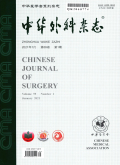重组活化凝血因子Ⅶ治疗心血管手术后渗血的临床探讨
The use of recombinant activated factor Ⅶ for blood loss after cardiovascular surgery
摘要目的 总结重组活化凝血因子Ⅶ(rFⅦa)治疗常规止血措施无效的心血管手术后渗血的初步经验.方法 回顾性分析2006年5月至2007年12月16例接受rFⅦa治疗的患者资料,其中男性15例,女性1例,年龄36~77岁,平均52岁.手术包括主动脉手术8例.瓣膜置换术6例,肺动脉内膜剥脱术1例和房间隔缺损修补术1例.应用rFⅦa治疗心血管外科术后渗血.结果 rFⅦa首次剂量27.6~54.5 ug/kg,平均40.2ug/kg,给药后6例达到止血效果.9例因出血持续于30 min内第2次给药,累计剂量59.3~90.9 ug/kg,平均80.3 ug/kg,8例获得止血,1例开胸探查.1例7 h内给药4次,累计剂量203.4 ug/kg后止血.给药后患者胸腔引流量明显下降,红细胞悬液、新鲜冰冻血浆、冷沉淀、血小板输注量明显减少.术后12 h内总引流量及红细胞悬液、冷沉淀输注量与给药距转流停机时间呈正相关.给药后凝血功能指标改善,全组患者在观察期间未发生血栓性并发症.结论 中小剂量rFⅦa应用于其他止血处理无效的心血管手术后渗血,可以减少引流量,降低血制品输注量.
更多相关知识
abstractsObjective To describe the early experiences with rFⅦa in the management of bleeding after cardiovascular surgery. Methods From May 2006 through December 2007, 16 patients received rFⅦa during or after surgery despite conventional medical therapy and transfusion of blood products. There were 15 male patients and 1 female patients, aged from 36 to 77 years old with a mean of 52 years old. The surgical procedures ineludee aortic procedures for 8 cases, valve replacement for 6 cases, pulmonary thromboendarterectomy for 1 case and atrial septal defect repair for 1 case. The data of these patients were reviewed and the safety and efficacy of rFⅦa after cardiovascular surgery were evaluated. Results rFⅦa was administered as a first dose of 27.6 to 54.5 μg/kg with a mean of 40.2 μg/kg. Six patients achieved hemostasis after the first dose. Nine patients received a second administration within 30 min, with a cumulative dose of 59.3 to 90.9ug/kg, a mean of 80.3 μg/kg. Eight patients achieved bemostasis and 1 patient went to exploration. One patient received four doses of rFⅦa with a cumulative dose of 203.4 μg/kg and the bleeding stopped. Mean amount of chest drain loss and the amount of red blood cell, fresh frozen plasma, cryoprecipitate, and platelet transfusions decreased significantly after rFⅦa administration. The total amount of chest drain losses, transfusions of red blood cell and cryoprecipitate within 12 h postoperatively was positively correlated with the time from the end of bypass to administration of rFⅦa. No thromboembolic complications and other adverse reactions were noted. Condusions The use of rFⅦa is associated with reduced blood loss, rapid improvement of coagulation variables, and decreased need for blood products, rFⅦa is safe and efficacious in the management of refractory postcardiotomy bleeding.
More相关知识
- 浏览311
- 被引3
- 下载88


相似文献
- 中文期刊
- 外文期刊
- 学位论文
- 会议论文



 换一批
换一批 换一批
换一批



